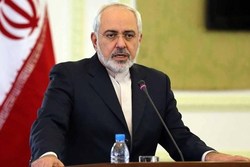 The Iranian foreign minister has hit out at the three European powers for failing to counter the US “economic terrorism” against Tehran, saying they are instead turning the spotlight on the Islamic Republic’s missile program to appease Washington.
The Iranian foreign minister has hit out at the three European powers for failing to counter the US “economic terrorism” against Tehran, saying they are instead turning the spotlight on the Islamic Republic’s missile program to appease Washington. RNA - In a tweet on Wednesday, Mohammad Javad Zarif pointed to the US withdrawal from the nuclear deal between Iran and world powers, known as the Joint Comprehensive Plan of Action, and lamented the EU trio’s failure to show a political will against Washington’s pressures.
“A year after US' unlawful abrogation of JCPOA, Europe can't muster political will to defy US' #EconomicTERRORISM. Not even by setting up a single banking channel for humanitarian aid,” said the tweet.
US President Donald Trump announced in May last year that he was quitting the JCPOA because of what he claimed was Iran’s constant violations. He also announced the reimposition of sanctions that has been lifted against Iran under the JCPOA.
Zarif said the UK, France and Germany would rather seek to appease Trump by pressuring the UN to provide a report on Iran’s missile activities than defy Washington’s measures.
“E3 are instead busy appeasing @realDonaldTrump by pressuring UN over our defensive capabilities,” the tweet added.
A year after US' unlawful abrogation of JCPOA, Europe can't muster political will to defy US' #EconomicTERRORISM. Not even by setting up a single banking channel for humanitarian aid.
E3 are instead busy appeasing @realDonaldTrump by pressuring UN over our defensive capabilities pic.twitter.com/o12KpUqZZM
— Javad Zarif (@JZarif) April 3, 2019
Britain, France and Germany are calling for a full UN report on Iran’s missile program, claiming the country’s missile activities violate UN Security Council Resolution 2231 that supports the Iran nuclear agreement, known as the Joint Comprehensive Plan of Action (JCPOA).
The European trio said in a letter sent to UN Secretary General Antonio Guterres on Tuesday that Iran's launch of a space vehicle and the unveiling of two new missiles in February were “inconsistent" with the resolution. The three countries, which are signatories to the JCPOA along with the US and China, asked Guterres to "report fully and thoroughly on Iranian ballistic missile activity" in his next report, which is expected in June.
According to Press TV, Iran says neither its space program nor its missile launches are banned under Resolution 2231.
The resolution, adopted in July 2015, terminated the provisions of previous UNSC resolutions against Iran, some of which had imposed restrictions on Iranian missile activities. Such activities are not prohibited under Resolution 2231, which merely calls on Iran “to refrain from any activity related to ballistic missiles designed to be capable of delivering nuclear weapons.”
The US asked for the inclusion of Iran’s missile program in any deal over Tehran’s nuclear program both during the course of negotiations that culminated in the JCPOA and after its conclusion.
However, Iran has stressed that its missile program is non-negotiable as it is part of the country’s deterrence.
847/940